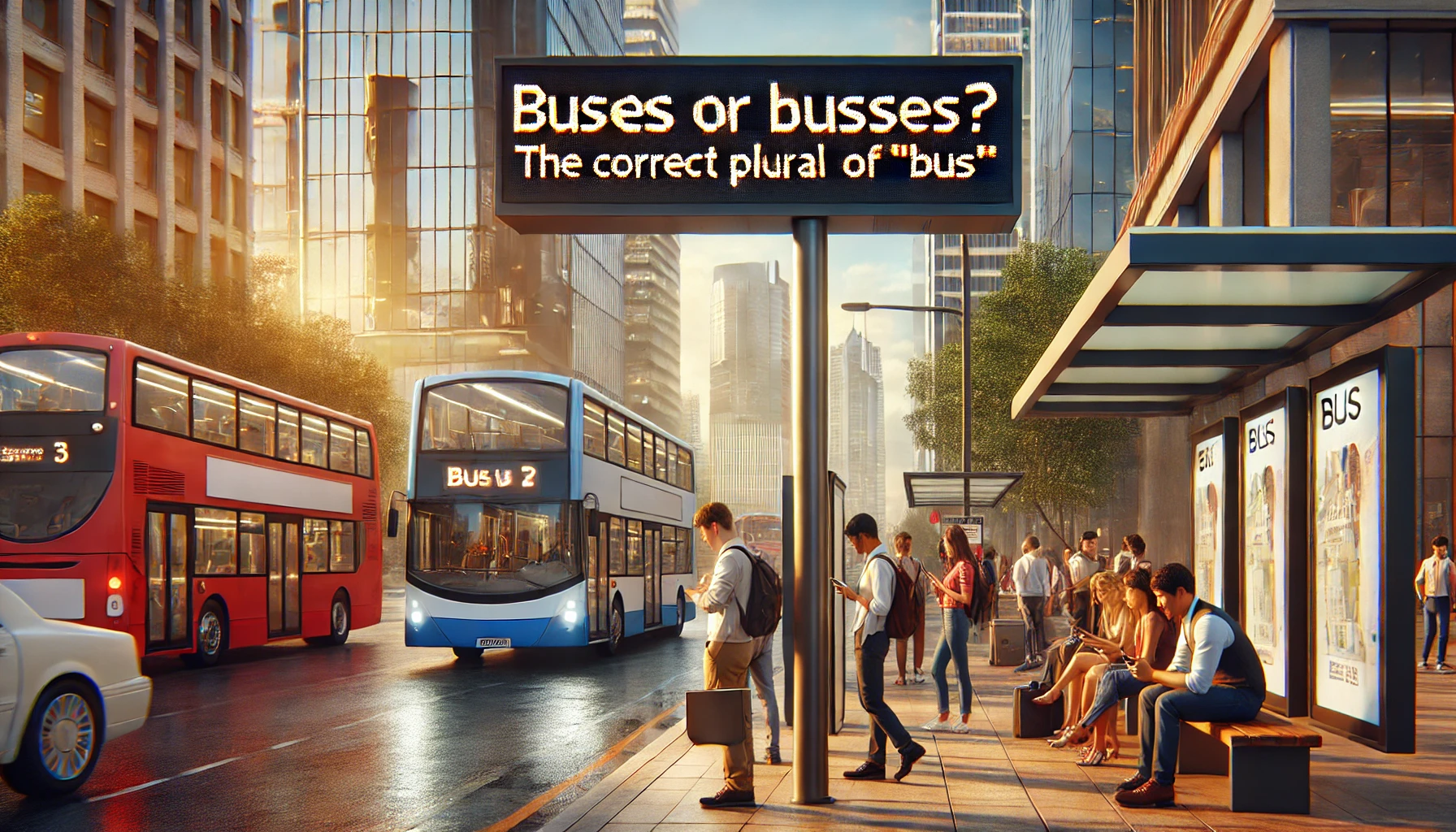The English language is full of quirks, and one common confusion is the plural form of “bus.” Should it be buses or busses? Many English learners—and even native speakers—find themselves second-guessing this choice. This article will break down the correct plural form, explain why one is preferred over the other, and explore the history of the word “bus.”
Understanding Pluralization in English
Before we dive into the specifics of “bus,” it’s important to understand pluralization rules in English.
Standard Rules of Pluralization
Most English nouns follow standard rules when forming their plural:
- If a noun ends in a vowel + “y,” add -s (e.g., toy → toys).
- If a noun ends in a consonant + “y,” change “y” to “i” and add -es (e.g., baby → babies).
- If a noun ends in “s,” “sh,” “ch,” “x,” or “z,” add -es (e.g., box → boxes).
- Some nouns have irregular plurals (e.g., child → children, man → men).
Since “bus” ends in “s,” one might assume its plural should be busses by adding “-es.” However, that isn’t the case. Let’s explore why.
Read More About This Article: Pre-existing or Preexisting – Which One is Correct?
The Correct Plural of “Bus”
The correct plural of “bus” in modern English is buses.
Why is “Buses” Correct?
- According to standard spelling conventions, nouns ending in “s” generally add -es for pluralization. However, “bus” is an exception to this rule.
- “Buses” follows the pattern of similar words like “gas” (gases) and “lens” (lenses).
- Linguists and grammarians agree that “buses” is the preferred form in standard English.
- It is the most commonly used plural form in public transportation, education, and official documents.
Why Do Some People Say “Busses”?
The word busses does exist, but it means something completely different. “Busses” is the plural of “buss,” which means “kiss.” This is an outdated term, but it still appears in historical contexts or poetry.
If you write “busses” instead of “buses,” you might accidentally be talking about multiple kisses instead of public transportation vehicles!
A Look at “Bus” and Its History
The word bus is actually a shortened form of “omnibus,” a Latin word meaning “for all.” The first public transportation vehicles were called “omnibuses” in the early 19th century. Over time, the word was shortened to “bus.”
Evolution of the Word “Bus”
| Year | Term Used | Explanation |
|---|---|---|
| Early 1800s | Omnibus | Latin for “for all,” referring to public transportation. |
| Mid-1800s | Bus | Shortened from “omnibus.” |
| 20th Century | Buses | Standard plural form. |
| Occasionally | Busses | Used mistakenly due to misunderstanding of pluralization rules. |
Real-World Usage: “Buses” vs. “Busses”
Which form do people actually use? Let’s examine real-world examples from dictionaries, data, and common usage.
Dictionary Definitions
Most reputable dictionaries confirm that “buses” is the correct plural.
- Merriam-Webster: “Buses is the plural of bus.”
- Oxford English Dictionary: “The standard plural of ‘bus’ is ‘buses.'”
- Cambridge Dictionary: “Buses” is the correct plural form in modern English.”
Usage in Books and Publications
A Google Ngram analysis comparing “buses” and “busses” in books over the last century shows a strong preference for “buses.”
Common Usage in Public Transportation
- “School buses transport millions of children daily.”
- “Public buses help reduce traffic congestion.”
- “Tour buses take visitors to famous landmarks.”
Using “busses” in these contexts would be incorrect and confusing.
Common Mistakes and How to Avoid Them
To ensure you always use the correct spelling, keep these tips in mind:
Quick Tips
✅ Use “buses” when talking about vehicles.
✅ Use “busses” only if referring to kisses (which is rare).
✅ Remember this sentence: “Public buses take commuters to work.” (“Busses” would make no sense here.)
Examples in Sentences
Correct:
- “The city purchased 50 new buses for public transportation.”
- “We waited at the stop for two buses to arrive.”
Incorrect:
- “The school has five busses for students.”
- “Many busses were late due to traffic.”
Final Verdict: Stick with “Buses”
To summarize:
- The correct plural of “bus” is buses.
- “Busses” refers to “kisses” and is not used for transportation.
- “Buses” is used in standard English, dictionaries, books, and public transportation.
- If in doubt, always choose buses to avoid confusion.
Conclusion
Next time you write about public transportation vehicles, you can confidently use buses instead of “busses.” The English language may have its quirks, but following spelling conventions ensures clarity. Spread the word, and help others avoid this common mistake!
Do you have any other confusing English words you’d like us to explain? Let us know!
